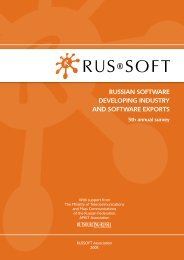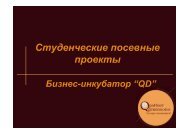russian software developing industry and software exports
russian software developing industry and software exports
russian software developing industry and software exports
Create successful ePaper yourself
Turn your PDF publications into a flip-book with our unique Google optimized e-Paper software.
Chapter 4.<br />
TAXATION SYSTEM<br />
The share of companies unsatisfied with the<br />
taxation system dropped from 45% до 37%.<br />
Moreover, it was evaluated as «good» by 11%. Such<br />
a big number of respondents happy with the taxation<br />
systems has never been registered in our survey over<br />
the past 5 years (in 2006 it was 4%, <strong>and</strong> in 2 recent<br />
years – 1%).<br />
Furthermore, the major companies comprising the<br />
bigger proportion of the total revenue <strong>and</strong> <strong>exports</strong><br />
became more critical of the taxation system than a<br />
year ago. Last year they rated it higher than smaller<br />
companies, but this year it became the opposite.<br />
Evaluations improved mainly owing to companies<br />
with the turnover less than 0.5 MUSD. Obviously, the<br />
stability <strong>and</strong> even expansion of the simplified taxation<br />
regime for small companies against the background<br />
of the statements made by the Government about<br />
the inevitability of the growth of tax burden on<br />
salaries <strong>and</strong> unsuccessful struggle of medium <strong>and</strong><br />
major <strong>software</strong> developers for more UST privileges<br />
motivates small business to evaluate its status <strong>and</strong><br />
future higher than other companies.<br />
Companies located outside St. Petersburg<br />
<strong>and</strong> Moscow evaluate the taxation system slightly<br />
better. There is no direct dependence on the share<br />
of <strong>exports</strong>.<br />
Due to the crisis <strong>and</strong> state budget reduction, the<br />
Government considers the option of a tax reform<br />
that would involve the replacement of the Unified<br />
Social Tax (UST) with social payments, the change<br />
of the scale <strong>and</strong> the increase in payments. These<br />
modifications may significantly increase the tax<br />
burden for <strong>software</strong> companies for which salaries<br />
are the main item of expenditure (social payments<br />
are imposed on the wages fund). According to<br />
expert estimates, additional payment will lead to<br />
the increase of the cost of <strong>software</strong> production by<br />
8-15%, which would greatly weaken Russia’s positions<br />
in the competition in the global market of <strong>software</strong><br />
development.<br />
60%<br />
50%<br />
40%<br />
30%<br />
20%<br />
45%<br />
54%<br />
Taxation system<br />
37%<br />
52%<br />
60%<br />
50%<br />
40%<br />
30%<br />
20%<br />
10%<br />
0%<br />
80%<br />
70%<br />
60%<br />
50%<br />
40%<br />
30%<br />
20%<br />
10%<br />
0%<br />
43%<br />
24%<br />
Overview of Business Environment<br />
for Software Development in Russia<br />
Taxation system by companies' location<br />
48%<br />
Moscow<br />
Poor<br />
63%<br />
up to 0.5 MUSD<br />
Poor<br />
39%<br />
52%<br />
9% 9%<br />
44% 44%<br />
12% 11%<br />
St. Petersburg<br />
Satisfactory<br />
33%<br />
Taxation system by companies' turnover<br />
from 0.5 MUSD<br />
to 4 MUSD<br />
In June 2009, the Ministry of Economic<br />
Development <strong>and</strong> Trade with the participation of the<br />
Ministry of Information <strong>and</strong> Communications prepared<br />
<strong>and</strong> submitted for consideration of the Government<br />
a package of anti-recessionary measures to support<br />
innovative business, especially Russian <strong>software</strong><br />
developers. This package stipulates the introduction<br />
of a unified preferential scale of social payments<br />
for all Russian <strong>software</strong> developers irrespective of<br />
whether they work for export or domestic market.<br />
The adoption of these measures would significantly<br />
exp<strong>and</strong> the existing privileges for <strong>software</strong> developers<br />
at the moment applicable only to residents of special<br />
economic zones <strong>and</strong> <strong>software</strong> exporters.<br />
55%<br />
Satisfactory<br />
36%<br />
BUREAUCRATIC AND<br />
ADMINISTRATIVE BARRIERS<br />
9%<br />
from 4 MUSD<br />
to 20 MUSD<br />
54%<br />
Others<br />
Good<br />
50% 50%<br />
Good<br />
13%<br />
0%<br />
over 20 MUSD<br />
10%<br />
0%<br />
2008 г.<br />
Poor<br />
1% 11%<br />
2009 г.<br />
Satisfactory<br />
Good<br />
Bureaucratic <strong>and</strong> administrative barriers<br />
remain one of the main problems in the <strong>industry</strong>,<br />
the resolution of which has seen no major progress.<br />
Nevertheless, compared to the last year the share<br />
of «bad» evaluations concerning the way this issue is<br />
32








